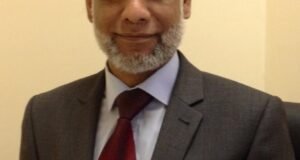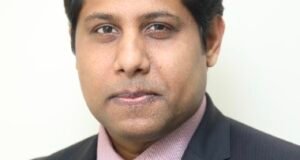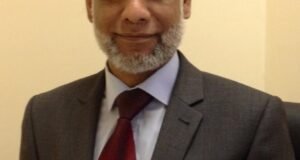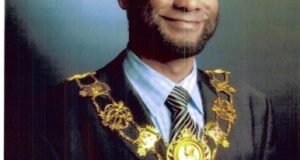
By Matiar Chowdhury:
February 21 is International Mother Language Day. Since the declaration of 21st February as International Mother Language Day by UNESCO on 17th November 1999, the Martyrs Day of Bangladesh (Mourning Day) has been observed as International Mother Language Day worldwide. All language people of the world celebrate the day as their mother tongue day.Whether the language is Bengali, Gujarati, Hindi, English or Arabic. The day is very significant for us because our state language is Bengali. And how many lives had to be sacrificed to establish this language as the state language of the then East Pakistan. The topic of today’s discussion is the recognition of International Mother Language Day from the beginning of the language movement.
State language / mother tongue
The state language and the mother tongue are not the same, linguists have defined it in this way. The language that is understood by all for the convenience of running the state and the language used by the majority of the population of the country is based on the opinion of all. In many countries of the world, more than one state language is in use. For example, the state languages of India are Hindi and English, our state languages are Bengali, English and Welsh in Great Britain. The most important thing is that there is no substitute for mother tongue. Mother tongue is required to master any language of the world. So, there is no alternative to mother tongue in education. Until the year 2000, we Bengalis have been observing this day as Shaheed Dibas (Day of Mourning). There has been bloodshed in Assam of Bangladesh and India for language. Therefore, the importance of this day is immense for the Bengalis of the world. Because in recognition of the sacrifices made by Bengalis for the language, in 1999, UNESCO paid homage to all the mother tongues of the world on November 17, the day of mourning in Bangladesh, February 21 was declared as the International Mother Language Day. Since then, the day has been celebrated all over the world as International Mother Language Day. This is a day of joy and sorrow for the Bengali-speaking people of the world, including Bangladesh. To convey the true history of the language movement to future generations. If we fail to present the truth of it, then the soul of the language martyrs will suffer and on the other hand the next generation will be deprived of knowing the exact history.
Sheikh Hasina’s contribution to the recognition of International Mother Language Day
We have had to burn a lot of wood to get the recognition of International Mother Language Day. Abdus Salam and Abul Barkat, two Canadian expatriates, demanded Bengali as the official language of the United Nations. When these two accomplished Bengalis contacted the Bangladesh government from Canada, the then Prime Minister Sheikh Hasina came forward and the Vice Chancellor of Rajshahi University sent a 13-member delegation to UNESCO, including Bangladesh High Commissioner to London Mr Saidur Rahman Khan. The delegation spent two weeks in Paris, the capital of France, and began lobbying with diplomats from various countries. Due to the lobbying of the Government of Bangladesh, the day was recognised as International Mother Language Day. According to lobbyists, Pakistan, which fired on the protesters in 1952, also voted for the international mother tongue. This would not have been possible if Prime Minister Sheikh Hasina, the daughter of the Father of the Nation, had not taken the initiative in recognising the International Mother Language Day. If the government believing in the spirit of the liberation war is not in power at this time, maybe the day will not get the status of international mother tongue. In recognition of International Mother Language Day, Sheikh Hasina, the daughter of the Father of the Nation, lobbied around the world as a representative of the government. The delegation member said. Saidur Rahman Khan, Vice-Chancellor of Rajshahi University, was later sent to London by the Government of Bangladesh as the High Commissioner. I had interviewed Saidur Rahman. According to him, if the Bangladesh government had not lobbied internationally at that time, the recognition of the International Mother Language Day on February 21 would not have been recognised under any circumstances.
International Language Institute:
Last but not least, Sheikh Hasina was the first to establish the International Language Institute in Bangladesh, through which research is being done on the exact history of Bengali as well as the development of other languages in Bangladesh. Especially people of different ethnic groups are getting opportunity to get education in their mother tongue. Not only that, but Sheikh Hasina has also given the opportunity to study all the languages of the world through the establishment of International Mother Tongue Institute in Dhaka.
The issue of arrest of Bangabandhu due to Jinnah’s irrational statements and protests in Dhaka
When India was divided on the basis of two nation theory in 1947, today’s Bangladesh became part of the communal state of Pakistan as East Pakistan. Then a part of the present Sylhet division was annexed to East Pakistan from Assam province in a referendum. The state language of all countries is determined by the number of language users.At the time of its inception, the newly formed state of Pakistan had a large number of Bengali speakers, both east and west. Considering that aspect, it was reasonable to make Bengali the state language of Pakistan. But the West wanted Urdu to be the state language of Pakistan. They even wanted to make Urdu the state language of Pakistan. Which was completely unjust and unreasonable. Because even today the people of Pakistan do not speak Urdu.Most Pakistanis are accustomed to speaking Punjabi-Pashto-Baloch and Hindi. According to the latest statistics of 2019, 8% of Pakistanis speak Urdu. They argued that since Pakistan is a Muslim state, Urdu should be the state language. At the same time, Hindi and English were made the state languages of independent India. The idea of many fanatical Pakistanis is that Hindi means Hindu language.Not only this, in the meeting of the Constituent Assembly held on 23 February 1948 to draft the constitution of Pakistan, Babu Shri Dhirendranath Dutta of Brahmanbaria (later martyred by the Pak army in 1971) demanded inclusion of Bengali as a constitutional language along with English and Urdu. On March 11 of the same year, students under the leadership of Father of the Nation Bangabandhu Sheikh Mujibur Rahman celebrated the first State Language Day in Dhaka city. This led to a storm of controversy in the intellectual circles of East and West Pakistan. But without any hesitation, the founder of Pakistan, Quaid-e-Azam Mohammad Ali Jinnah came to Dhaka on March 21, 1948 and announced that Urdu would be the state language of Pakistan. It was uttered by him at a public meeting at Ramna (Urdu will be the state language of Pakistan.) He said the same thing again at the convocation of the university. Bangabandhu Sheikh Mujibur Rahman protested Jinnah’s statement at the meeting place. The people of Bengal were shocked by the irrational statement of Quaid-e-Azam Mohammad Ali Jinnah. The Bengalis could not accept Jinnah’s irrational remarks. The state language protested against the statement of Quaid-e-Azam Mohammad Ali Jinnah, the founder of Pakistan.The Pakistani ruling party arrested Bangabandhu Sheikh Mujibur Rahman and Shamsul Haque for being vocal in their demands.Since Bengali is the native language of the majority of the people of Pakistan, Bengali should be the state language of Pakistan. Since the state of Pakistan was born on the basis of imperialism, they did not agree to accept Bengali as the state language of East Pakistan under any circumstances. Quaid-e-Azam Mohammad Ali Jinnah’s remarks on language disappointed the people of East Bengal. Demonstrations were held all over Dhaka. Later, an agreement was signed by Khwaja Nazim Uddin with the Rashtrobhasha Sangram Committee. Thoughts started in the conscious court about this.
From 1948 to 1951, the people of Bengal observed March 11 every year as the State Language Day. On 26 January 1952, the Prime Minister of Pakistan Khwaja Nazim Uddin reiterated at the Dhaka session of the Muslim League that Urdu would be the state language of Pakistan. After his statement, the people of Bengal started organising for the same demand. Based on this, a strike was observed in all educational institutions in Dhaka city on 4 February.
A general strike was called across the country on 20 February. On that day, Prime Minister Khwaja Nazim Uddin and Chief Minister of the provincial government Nurul Amin of Mymensingh issued Section 144 across the country. On February 21, Abdul Jabbar, Abul Barkat, Rafiq Uddin and some others were martyred by the Pakistani police for violating Article 144 and demanding the establishment of Bengali as the state language.On February 22, people across the country erupted. Shafiur Rahman, Abdul Awal and Abdur Rahim were martyred on the spot when police again opened fire on the procession in Dhaka. On 23 February, the students at Dhaka Medical College built the first eleven feet long Shaheed Minar according to the design of Syed Haider. It was inaugurated on February 24 by Shaheed Shafiur Rahman’s father.
Language movement in other parts of Bengal including Sylhet and Bengal in 1927 at the Assam Executive Meeting
Now let us come to the context of the beginning of the language movement, how the language movement started in 1927 and about the contribution of other regions of Bengal including Sylhet in the language movement. What many do not know is that some of the modern historians want to avoid the subject again tactfully. A review of the history of the Shaheed Minar in Great Britain shows that they were established by the efforts of the British Sylhetis living in Britain. No movement emerges suddenly. Some of the specific reasons behind this are the formation of thought consciousness public opinion and the need for action. Those who sow the seeds of a movement in the initial stages are undoubtedly far-sighted. There is a saying ‘Madhyahatte Nasti in Srihatta.’ From that point of view, this fact can be seen in the case of language movement. The language movement spread beyond the confines of Dhaka or Sylhet. Journalist researcher Abdul Hamid Manik has divided Sylhet’s contribution to the language movement into three parts. That is, from 1948 to 1948 and from 1948 to March 1952. And the role of the people of Sylhet region was pioneering in these three stages.
Police expedition in Golapganj, Sylhet in 1923
I would like to clarify the issue here to save the real truth of the language movement. In recent times, some writers are writing the history of the language movement, they are trying to hide the truth. Let us move on to the main topic of British rule, the period of anti-British movement in the whole of India was in1923.
There was a caliphate activist named Makhfur Ali Amin of Maizbagh village in Golapganj Upazila of Sylhet. The police operation was carried out in his house due to his anti-British role. The police officer who conducted the operation was named Abdul Hamid Akhand. Police searched Makhfur Ali’s house and insulted the Holy Quran. He even threw the Holy Qur’an on the ground. The news of the desecration of the Qur’an was published with pictures in the weekly Janshakti edited by Nikunj Bihari Goswami from Sylhet. Three years after the incident, Abdul Hamid Chowdhury (Sona Miah), a member of the then Assam Executive Council, son of Rankeli village in Golapganj, raised the issue at the Assam Executive Meeting. At that time, it was customary to speak in English at the Assam management meeting. Managing member Abdul Hamid Chowdhury (Sona Miah) while speaking in Bengali, the speaker suggested to speak in English without answering his question.At that time other Sylheti members of the managing meeting got up at once and protested against the speaker. So let him speak in Bengali. After much argument, the speaker allowed him to speak in Bengali. From then on, the Sylheti members of the Assam Management Council spoke in Bengali.Notable among the Sylheti members who were present at the meeting were Abdur Rashid Chowdhury, Dewan Abdul Basit, Brajendra Narayan Chowdhury, Bipin Chandra Pal, Modabdir Hossain Chowdhury, Abdul Hamid Chowdhury and others. After a long debate, the law was passed in the Assam Executive Council. Bengali will be used in state affairs instead of English.From this day onwards, Bengal was recognised in the Assam Provincial Managers’ Meeting.
After the partition of India in 1947, the first language movement was started from Sylhet
After the partition of India in 1947, the first language movement was started from Sylhet. Another reason was that when India was divided, a part of Sylhet was annexed from Assam to the then East Pakistan through a referendum.Which is the present Sylhet division. There are a lot of complaints even about this referendum. Supporters of Ulamayehind in Congress and Jamiat could not accept Sylhet’s annexation by Pakistan. Their allegation was that Sylhet was included in East Pakistan through vote robbery. The border between the two countries is demarcated through Ratcliff, ignoring not only vote rigging but also referendum verdicts.The people of then (Moulvibazar subdivision) South Sylhet voted for undivided India and the people of Karimganj subdivision voted for Pakistan, Karimganj was included in India and South Sylhet was included in East Pakistan. Even Muslim League activists could not accept Urdu as the state language of Pakistan. They argued that the Pakistani government was trying to establish Urdu in a communal way without respecting the language of the majority of the people.
The Sylhet-based journalist-literate student community became vocal from the beginning. Monthly Al-Islah, edited by Muhammad Nurul Haq, one of the founders of Sylhet Central Muslim Sahitya Sangsad, under the direction of philosopher Dewan Azraf and politician Mahmud Ali.The weekly Nowbelal played a bold and clear role for Bengal at that time. No daily newspaper was published from Dhaka in 1947 when Nowbelal raised his voice in favor of Bengal. In fact, in 1948, the only mouthpiece of the language movement in East Bengal was the Nowbelal of Sylhet. Its effect was felt all over Bengal including Sylhet.Before 1947, no one thought about the language of the newly formed state of Pakistan. Aligarh University Vice-Chancellor Dr Zia Uddin wrote an article in the daily Azad recommending Urdu to be the state language of Pakistan, refuting Dr Muhammad Shahidullah Zia Uddin’s argument. In September 1947, the Tamaddun Majlish in Dhaka, under the direction of Professor Shahed Ali, son of Dharmapasha of Sunamganj, published a booklet entitled Bangla Na Urdu, the State Language of Pakistan.At the annual meeting of Sylhet Central Muslim Sahitya Sangsad on 9th November of the same year at Sylhet Alia Madrasa, the then education officer Muslim Chowdhury, a son of Chaila village of Chhatak in Sunamganj, presented an article in favor of Rashtrobhasha Bangla. Moulvibazar’ s accomplished writer Syed Mujtaba Ali was present as the chief guest on the occasion. On that day, the Muslim League supporters tried to thwart the programme but failed.Syed Mujtaba Ali played a very adventurous role. At the meeting place, a professor repeatedly tried to sabotage the event by chanting slogans in favour of making Arabic the state language of Pakistan. The article that Muslim Chowdhury read at the rally, ignoring all threats from the government and the ruling party, was later published in the monthly Al-Isla. The article is still preserved in the Muslim Sahitya Sangsad.This article was later reprinted in Village Digest. Al-Islah Editor Mr Nurul Haq continued his correspondence throughout Bangladesh. From 1947 to 1952, procession meetings for the state language Bengal continued in all the villages of Greater Sylhet. News of each meeting was published in Al-Islah.Many of the political and student leaders of that time who played an admirable role in this movement are no more in this world today. Notable among them are Literary Matin Uddin Ahmed, Dr Syed Mujtaba Ali, Maulana Ibrahim Chatuli, Maulana Shakhawatul Ambia, Former Foreign Minister Abdus Samad Azad, Former Minister Dewan Farid Gazi, Comrade Asaddar Ali, Pir Habibur Rahman, A. H Saadat Khan, Begum Jobeda Rahim Chowdhury, Syeda Sahera Banu, Syeda Lutfunnesa Khatun, Mahbub Ali, Abdul Hai (Sunamganj) Dewan Mujibur Rahman Chowdhury, Maulvi Abdur Rashid Chowdhury, Rafiqul Haque Chowdhury, Abdur Nur Chowdhury, Maulana Redwan Uddin Chowdhury, Chowdhury The names of former Finance Minister of Bangladesh Abul Maal Abdul Mohit, Begum Hajera Mahmud, Dewan Ohidur Reza and others are noteworthy.
On the other hand, on 23 February 1951 in Dhaka, the country’s leading intellectuals including Dr Shahid Ullah and Ibrahim Kha handed over a memorandum to the Prime Minister of Pakistan. The East Pakistan Cultural Conference was held in Chittagong from 16 to 19 March 1951 in which demands were made for the state language Bengal. The rally was held on 31 December 1951 at Paltan Maidan in Dhaka. An all-party student struggle council was formed on February 7.I have recently had the opportunity to read a number of articles on the language movement. Many writers have avoided the role of Father of the Nation Bangabandhu Sheikh Mujibur Rahman in the language movement. Bangabandhu was the first to be arrested for speaking on behalf of the state language of Bengal. Although he was imprisoned, his contacts with the protesters were constant, he said. The independence movement was started by using the language movement as a ladder. The language movement and the liberation struggle of 1971 are tied in the same thread.
Contribution of Bangladesh Army to the spread of Bangla language in Sierra Leone
Apart from Bangladesh, Bengali is the official language of an African country, the name of the country is Sierra Leone. The Sierra Leonean government has declared Bengali as the state language along with their language. Members of the Bangladesh peacekeeping force who took part in the international peacekeeping mission claimed its credit. The members of the Bangladesh Army who took part in the peace mission in Sierra Leone have embraced the people of Sierra Leone with love. Fascinated by the sincerity and love of service of the members of the army of Bangladesh, the common people of that country also became attracted to our language and culture. The Sierra Leoneans voluntarily became interested in learning Bangla. Bangladesh Army members have brought peace to Sierra Leone as well as conveyed our language and culture to the people of that country. Half of the population of Sierra Leone is now accustomed to speaking Bengali in addition to the Sierra Leonean language.Although there are more than eight thousand languages in the world, Bengali ranks sixth in terms of number of language users. For good reason, there is a demand to make Bengali the official language of the United Nations. The Government of Bangladesh is in talks with the United Nations. May International Mother Language Day be immortal. At the same time, I would like to conclude by quoting a line from the immortal Ekushey song of the living legend linguist Abdul Gaffar Choudhury, “Can I forget the Ekushey February painted in my brother’s blood?”
(Source: Serial Article Historian Monir Uddin Chowdhury Sylhet Samachar 1980, Matiar Rahman Chowdhury 21 February Issue Weekly Chitrakalpa Dhaka 1981, Rafiqur Rahman Laju 21 Issue Daily Sylhet Dak Sylhet 2003, History of Moulvibazar District Rabbani Chowdhury forthcoming publication Dhaka 2000 Haq edited February 1954 issue, Abdul Hamid Chowdhury, Sonamia Author Rafiq Ahmad Chowdhury Sylhet 1987, Sylhet District Gazetteer 1974, Sylhet Contribution to Language Movement Abdul Hamid Manik Islamic Foundation Dhaka-1983 Saidur Rahman Khan Former High Commissioner London UK.)
Caption:. 1 Writer next to the grave of Basha Shaheed Barkat in Azimpur Cemetery.
(London 11th February 2024)(Author: Matiar Chowdhury is a well-known journalist-writer-researcher living in the UK.)
 Weekly Bangla Mirror | Bangla Mirror, Bangladeshi news in UK, bangla mirror news
Weekly Bangla Mirror | Bangla Mirror, Bangladeshi news in UK, bangla mirror news





